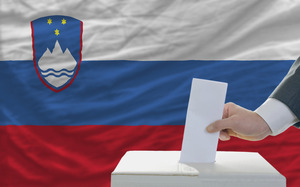 All is not well in Slovenia, a sliver-sized former Yugoslav republic with a population of two million and covering only 7,827 square miles in southern Central Europe. The country is wedged between the Alps and the northern Adriatic coast.
All is not well in Slovenia, a sliver-sized former Yugoslav republic with a population of two million and covering only 7,827 square miles in southern Central Europe. The country is wedged between the Alps and the northern Adriatic coast.For starters, Alenka Bratusek no longer is prime minister of the Euro zone member country. Her own party booted her out in May after only 13 months in office. Now the former Finance Ministry official is clamoring for a quick new election because she wants to stay in politics.
Her center left coalition government lost its leadership in the Parliament. But the government staved off an international financial bailout in December 2013 by pumping 3.3 billion euros of state funds into Slovenia's troubled banks.
Now new Parliamentary elections are scheduled for July 13 and the 44-year-old Bratusek hints she may form a new party to challenge all rivals. Meanwhile, her government will continue to rule in a caretaker capacity.
All this politicking comes as Slovenia is in the middle of closing large privatization deals to keep it afloat. Slovenia has already covered its financial needs for 2014 by issuing four bonds with a total value of about 4.5 billion euros.
Slovenia has until now been reluctant to sell its major firms, which include banks, insurers and energy companies. More than 20 years after the fall of communism and a decade after Slovenia joined the European Union, the government still controls about 50 percent of the economy. But it has started to privatize the largest telecoms operator Telekom and planned to sell another 12 state firms by 2015, including Slovenia's second largest bank, Nova KBM.
Calls for halting or scaling down privatization are dominating the ongoing election campaign.
The outgoing center-left Slovenian government says it has halted all ongoing sales of state-owned companies until a new cabinet is formed after the July 13 parliamentary election. The banking sector bailout prevented Slovenia from seeking Ireland-style aid from the European Central Bank and the European Union.
At a national level, Slovenia elects a president and a legislature. The president is elected for a five-year term using the Run-Off system.
The National Assembly (Državni zbor), Slovenia's parliament, has 90 members each elected for four-year terms. All but two of these are elected using the D'Hondt Method of list proportional representation. The remaining two members are elected by the Italian and Hungarian ethnic minorities using the Borda count.
Slovenia's multi-party system means that any one party is unlikely to gain power alone. Coalition governments must therefore be negotiated and formed.
Since the early 1990s Slovenia has sought to limit foreign ownership of its companies. With gross domestic product currently at 88 percent of the European Union average, Slovenia is considered the richest among former socialist states in Central Europe.

 By
By 